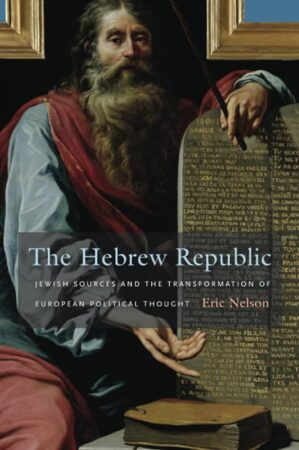
Okay, this book is not a popular-level page turner, but if you are interested in the subject, as I suspect a bunch of you are, it serves very well as a scholarly page turner. The book is The Hebrew Republic by Eric Nelson, and the subtitle gives a bunch of the game away. That subtitle is “Jewish Sources and the Transformation of European Political Thought.”
At the time of the Reformation, not only did the Reformed ranks contain the foremost patristic scholars of their day, but they also contained the foremost Hebraists. The rallying cry was ad fontes, back to the sources, and this included the Old Testament, in the original. But in order to get to that original, people had to learn Hebrew, and that meant resorting to the rabbis—and not just to learn basic Hebrew grammar either.
There are a few basic takeaways from this book. The first thing doesn’t really have to do with any of the particular doctrinal issues that the book delves into, but rather the historic light it shines on our contemporary (and ostensibly) Reformed types who are playing footsie with antisemitism. There is no particular refutation here, but it does serve to put a red clown nose on the whole thing.
The two biggest issues that Nelson addresses were Erastianism and the ancient Hebrew land laws. Modern republicanism grew up out of some fierce debates among the Reformed, and this included church/state relations (Erastianism) and land distribution (and how the Jubilee laws related to it). Mixed in with this debate was the rise of first wave Arminianism, which was simply the introduction of humanism into the Reformed stream. Troublers of Israel during this time included men like Grotius (whom John Owen once called “that Ishmael”), and two tons of no good came from his involvement. Second wave Arminianism (the kind we are more accustomed to) came from the Wesleys, and was more evangelical and less damaging, but still more than a minor problem. But that was a century later and doesn’t come into this period. Sorry, got distracted.
Erastianism is the view that if the state is a believing Christian state, then the church needs to be subservient to the state. But the Erastian argument was not a direct appeal to the rising secular state, but rather to the political arrangements of ancient Israel. Josiah reformed the church, but was not a church reformer—he was the king. Men like Hooker and Selden, for example, were Erastians, as was the entire Elizabethan settlement. Men like Calvin fought for independence for the church. At the Westminster Assembly (convened by a bunch of Erastians in parliament), the anti-Erastians included men like George Gillespie. I am with Calvin and Gillespie, of course, but the interesting thing is that both sides of the debate were thorough-going theonomists. They all agreed that whatever arrangement the ancient Hebrew republic had, that arrangement should be what we were striving for.
On land distribution, the received opinion was inherited from Cicero, and his view that the populist land reforms proposed by the Gracchi brothers amounted to little more than destabilizing theft. What happened in the Reformation is that some among the Reformed flipped the script and began to argue that the ancient Hebrew Jubilee amounted to a divine endorsement of a certain species of agrarian distributism. This was one of those debates where almost everyone had a good point. This was not without a downstream impact. For example, the American example of rejecting primogeniture when it came to land inheritance did prevent the establishment of huge landed aristocratic families (with third sons sent off to the Navy or into the ranks of the clergy).
But again, the high level takeaway is that it enables you to see how many of our modern political assumptions are indebted in various ways to the rabbinic biblical commentaries and interpretations of the Talmud, and the Reformed scholars who bequeathed those assumptions to us.
This is a very informative book.

